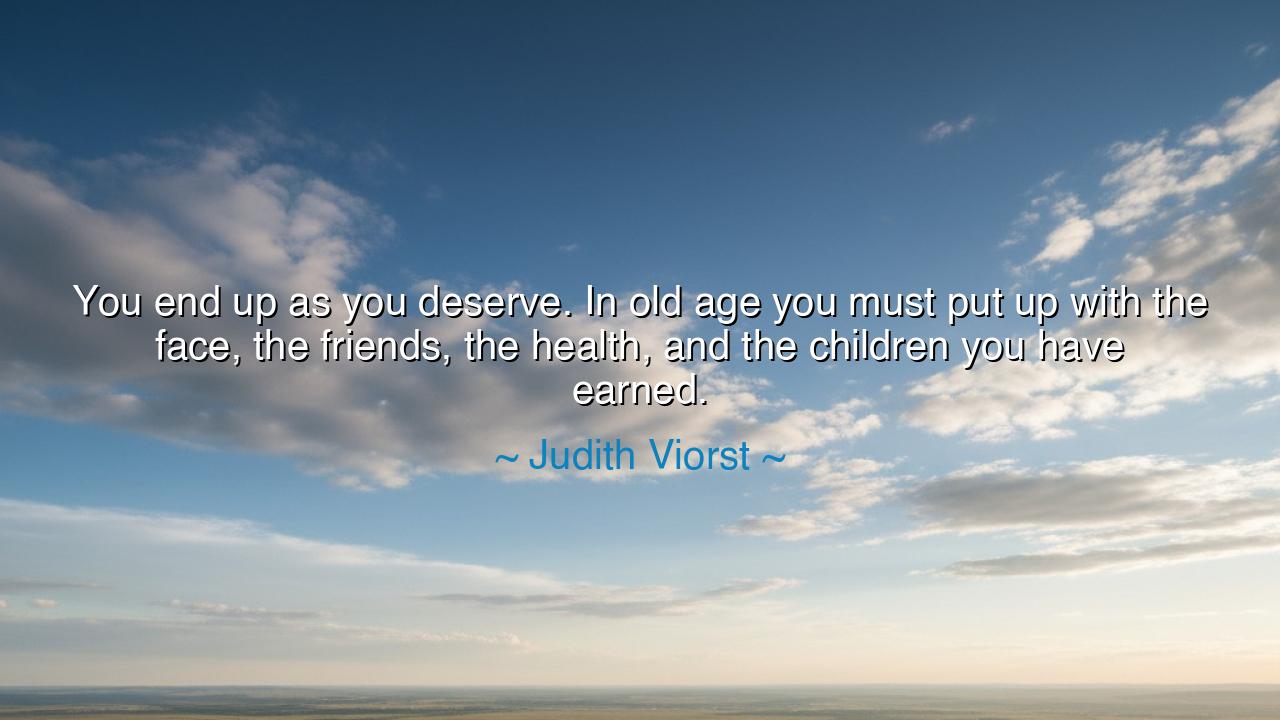
You end up as you deserve. In old age you must put up with the
You end up as you deserve. In old age you must put up with the face, the friends, the health, and the children you have earned.






"You end up as you deserve. In old age you must put up with the face, the friends, the health, and the children you have earned." - Judith Viorst. These words carry with them a powerful message about the consequences of the life we lead and the choices we make. In old age, we are not simply victims of time, but the living embodiment of the decisions, actions, and attitudes we have cultivated throughout our lives. Our face, with its lines and wrinkles, is not just a record of passing years but a reflection of our emotional life, our joys, our sorrows, and the way we have interacted with the world. Similarly, our friends, our health, and even our children—all of these are shaped by the choices we have made. Viorst’s words are a reminder that the outcome of our lives is not random but is the result of how we have lived, loved, and treated others.
The ancient philosophers often spoke of the importance of character in shaping one’s future. Socrates, for example, taught that a life of virtue—one of honesty, integrity, and purpose—leads to a life well-lived, and that the consequences of one’s actions cannot be avoided. Aristotle went further, suggesting that the habits we form over time shape not only our actions but our very character. In this sense, Viorst’s quote is a modern echo of the ancient wisdom: we do not passively age into our circumstances; we actively create them through our choices. As the Stoics taught, we are responsible for the lives we lead, and thus, the lives we have in our later years are the direct result of how we have lived in our earlier ones.
Consider the life of Leonardo da Vinci, whose incredible genius and work ethic were hallmarks of his youth. As he aged, da Vinci's choices to continue pursuing new ideas, to challenge himself intellectually, and to remain curious about the world around him, allowed him to remain relevant and vibrant well into his later years. Despite the physical decline that comes with age, da Vinci's face, like his legacy, remained one of creativity and intellect. The friends he chose—other great thinkers, scientists, and artists—furthered his growth and deepened his understanding of the world. The health he maintained through a disciplined lifestyle and mental engagement allowed him to continue creating until his final days. In this, da Vinci shows that old age does not need to be something we “put up with,” but rather something we actively shape by the lives we live, the work we do, and the relationships we build.
In contrast, take the life of King Henry VIII, whose decisions and actions over his lifetime left him with a legacy of personal ruin. Henry’s impulsive nature, his self-indulgence, and his disregard for others—particularly his wives, children, and advisors—left him isolated in his later years. His health, once vibrant in his youth, was severely compromised by gluttony and poor choices, and his face, marked by excess and indulgence, reflected the inner turmoil that had consumed him. His relationships with his children were fraught with tragedy, as he made choices that led to estrangement and betrayal. Henry’s story is a vivid reminder that we do, in fact, earn the quality of our later years through the choices we make. Viorst’s words ring true in his life—he “ended up as he deserved,” with a legacy marred by poor decisions and unresolved regrets.
The essence of Viorst’s message is that, in our later years, we are faced with the consequences of how we have lived. If we have chosen selfishness, indifference, and recklessness, we may find ourselves with regrets and regrets alone in our old age. But if we have chosen love, honesty, kindness, and dedication, we may find that, even as our bodies age, our soul remains vibrant, our relationships strong, and our health nurtured by the very lifestyle we have lived. The quality of life in old age, then, is not a random event but a natural progression of how we have spent our days—whether in pursuit of self or in service of others.
The lesson from Viorst's words is clear: take responsibility for your actions, for the decisions you make today will shape the life you live tomorrow. In the moments when you are tempted to neglect your health, ignore the feelings of others, or abandon your dreams, remember that your future self will bear the fruit of these decisions. Let your choices today be a reflection of the kind of legacy you wish to leave in the years to come. Engage fully with the world around you, treat others with respect and kindness, and nurture your body and mind. By doing so, you can ensure that when the time comes to reflect on the life you have lived, you can be proud of the face you wear, the friends you keep, and the legacy you leave behind.
Thus, the practical advice is simple yet profound: live a life of purpose, be mindful of the impact your choices have on others, and know that the way you treat yourself and the world around you will echo in your later years. Build strong relationships, maintain integrity, and continue to learn, grow, and contribute. Your future self will thank you for the choices you make today, and you will not merely “put up with” old age but will face it with grace, fulfillment, and contentment.






AAdministratorAdministrator
Welcome, honored guests. Please leave a comment, we will respond soon